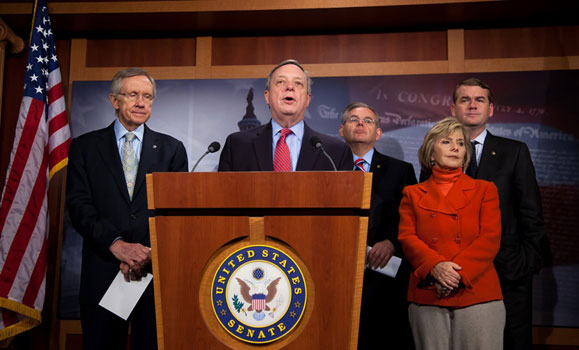The bipartisan group of six senators privately drafting a debt and deficit reduction plan have been unusually tight-lipped about their negotiations. That’s probably necessary internally if the group’s goal is to come to an agreement. But it’s led to intense speculation about what’s on the table, what shape their policy options are taking, and whether progressives will get a raw deal.
Of the six — Dick Durbin (D-IL), Mark Warner (D-VA), Kent Conrad (D-ND), Saxby Chambliss (R-GA), Tom Coburn (R-OK), and Mike Crapo (R-ID) — only Durbin could be fairly described as a progressive. So the race is on to figure out where his bright lines are, and to what, if any, extent he’s willing to walk away if the final agreement completely undermines progressive interests. But while his public statements in recent weeks don’t lay out exactly what those bright lines are, he’s tipped his hand in two important ways.
One big tell was his official public response to the House Republican budget, which doesn’t meaningfully touch Social Security but basically obliterates Medicare and Medicaid, while not raising any new revenue, and lowering taxes on wealthy Americans.
In an official statement reacting to the plan, Durbin said “The Ryan Republican budget has three pillars: reduce Medicare benefits by more than half; reduce Medicaid benefits for seniors in nursing homes; and reduce taxes on the wealthiest Americans. America can resolve its budget crisis without punishing the elderly and poor while rewarding the very rich.”
Elsewhere he went further: “The Republican budget proposal ends Medicare as we know it and tries to balance the budget on the backs of the most vulnerable in our society,” Sen. Durbin said. “Any proposal to solve our fiscal crisis needs to reflect our priorities as a nation. We can control spending without sacrificing our values.”
Republicans have been clear that there’s almost no common ground between the parties on health care issues. That’s why their budget places such a heavy focus on health care entitlements, and punts on Social Security, where they hope to be able to strike a bipartisan deal.
Which brings us to Social Security, where Durbin’s rhetoric is remarkably different. As a member of the White House fiscal commission, Durbin voted for the Simpson-Bowles proposal, which brought Social Security into long-term actuarial balance with a mix of benefit cuts, including a slow increase in the retirement age, and revenue increases. And he recently refused to endorse a resolution authored by Sen. Bernie Sanders (I-VT) holding that Social Security benefits should not be cut as part of a debt reduction plan.
“I think Bernie is going too far with his language,” Durbin said critically.
If these starkly different postures are any indication, the so-called Gang of Six is placing a heavy focus on Social Security, including benefit cuts, while holding back on health care entitlements. Any plan they outline will have to pass muster with the Obama administration. A senior Treasury Department official recently told a group of reporters on background that the administration won’t accept entitlements that run afoul of the progressive push to preserve benefits to without making sure that revenues are on the table in a meaningful way.
Revenues outside of Social Security are a different issue, and may ultimately be the reason why Republicans walk away from any deal. Coburn — a staunch conservative — found himself caught up in a public spat with anti-tax crusader Grover Norquist over suggesting that increased revenue of any kind should factor into what’s supposed to be a debt-reduction bill. For Republicans to be at the table at all, there can’t be talk about significant new revenues, and if Norquist gets his way there won’t be any at all.
That’s the silhouette of the plan they’re negotiating.










